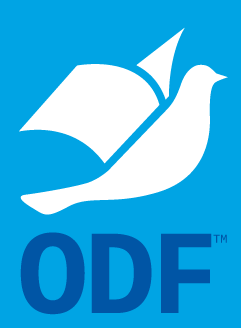Although I started recently to do it, some people have complained, other have misunderstood. I must admit it: if someone did the same to me, I would have done the same.
I send my documents in Open Document formats.
Actually, I send them by duplicate. That's because Office (which is the offimatic suite most people use) does not support ODF, and I am actually interested on the other people to see it.
Why support ODF? It sucks. Lots.
I don't know much about its specifications. But it's short, and some claim way underdocumented. It cannot be implemented well in Microsoft's applications, and it has had very little reception. That's talking about the format itself, but for the software, OpenOffice, which is the main competitor for Microsoft Office and is the main force in the adoption of ODF also sucks. Their suit doesn't have as much as functionality, plugins, organizational support, widespread adoption, eye-candy, etc. Your call.
So, what drives me to support ODF? Isn't it obvious? It's open. And open means, among other things: 1) we are not tied to a particular vendor any more, and 2) we, as a community, can improve it. And open source has proved many times that once sucky products later become leaders in their market. And making it depends on us as a community (I am not involved in any manner in the development of ODF, but I am user as well, and by exposing these kind of things I hope I help it)

I am not against OOXML or other standards. But I am against monopolies. I am in pro of ODF, call it whim, call it open-mindedness. OOXML is far away of being an standard. Being used by most of the population is not a valid reason for being so. And world needs standards.
I send my documents in Open Document formats.
Actually, I send them by duplicate. That's because Office (which is the offimatic suite most people use) does not support ODF, and I am actually interested on the other people to see it.
Why support ODF? It sucks. Lots.
I don't know much about its specifications. But it's short, and some claim way underdocumented. It cannot be implemented well in Microsoft's applications, and it has had very little reception. That's talking about the format itself, but for the software, OpenOffice, which is the main competitor for Microsoft Office and is the main force in the adoption of ODF also sucks. Their suit doesn't have as much as functionality, plugins, organizational support, widespread adoption, eye-candy, etc. Your call.
So, what drives me to support ODF? Isn't it obvious? It's open. And open means, among other things: 1) we are not tied to a particular vendor any more, and 2) we, as a community, can improve it. And open source has proved many times that once sucky products later become leaders in their market. And making it depends on us as a community (I am not involved in any manner in the development of ODF, but I am user as well, and by exposing these kind of things I hope I help it)

I am not against OOXML or other


